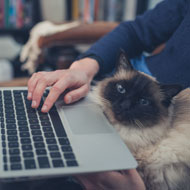
Charity studies effect of cats on teenagers
More than 80 per cent of cat-owning teenagers agree that spending time with their pet can reduce exam stress, according to a new survey.
Coordinated by Cats Protection, the survey found that 67 per cent of 14-19-year-olds agree that their cat helps them to cope with difficult situations. A further 86 per cent of teenagers found it soothing to stroke their cat and listen to it purr.
The announcement comes after years of studies showing that pets can help to reduce stress and even lower blood pressure.
When questioned about the reasons for their stress, 72 per cent of teenagers cited exam pressure. The majority of respondents (55 per cent) said that having a cat around when studying helped to calm their nerves.
“The companionship that a pet offers is a great way to reduce anxiety and stress because the affection they give back is so simple,” explains consultant clinical psychologist Elie Godsi.
“Unlike many other pets, cats make it absolutely clear when they want to be played with or stroked, or not! It can be really reassuring for teenagers who may be experiencing, for example, relationship issues or exam pressures, to spend time playing with or stroking a cat: this can help to enhance their mood as the friendship and acceptance of a loving pet makes the world a much better place.”
One student benefiting from the calm demeanour of a cat is 15-year-old Nia from Birmingham. Mia attends secondary school where she is studying hard for her GCSEs. When asked about how her cat Damon helps her through difficult times, Mia said:
"It's like he can sense when I'm stressed. I'll be feeling anxious and then he jumps up on my lap and chirps a purry meow and rubs his head on my chin to let me know it's ok."
The survey of 1,000 respondents also assessed how much the teenagers depended on their cat for emotional support.
A staggering 72 per cent said that their cat was more likely to always be there for them than their friends. They also stated that their cat was more likely to love them unconditionally.



 The Veterinary Medicines Directorate (VMD) is inviting applications from veterinary students to attend a one-week extramural studies (EMS) placement in July 2026.
The Veterinary Medicines Directorate (VMD) is inviting applications from veterinary students to attend a one-week extramural studies (EMS) placement in July 2026.